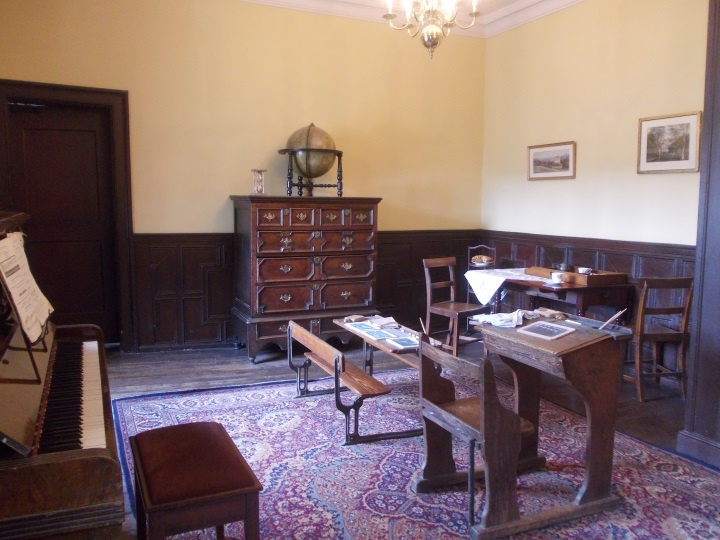
The Schoolroom at Lyme Park (Photo: J Starnes)
Earlier this month, Diana Birchall took us with her on a lovely visit to Jane Austen’s school, then Maria Grace gave us detailed and thought-provoking insights into Mr Darcy’s education (you can find the posts by following the links).
It’s fascinating and extremely poignant to imagine Mr Darcy’s early school years, and I’d like to think that he had older cousins at his side, keeping the bullies at bay – or at least one older cousin in possession of a fighting spirit that would stand him in good stead later, in his military career.
It’s also poignant to imagine what he might have done during school holidays, or whether his parents were benevolent or strict. Glimpses of real-life Georgian families make the Darcys a little easier to picture, so I loved coming across Adeline Hartcup’s Children of the Great Country House, a book about childhood through the ages, which revealed a thing or two about some of the names we have come to know so well.
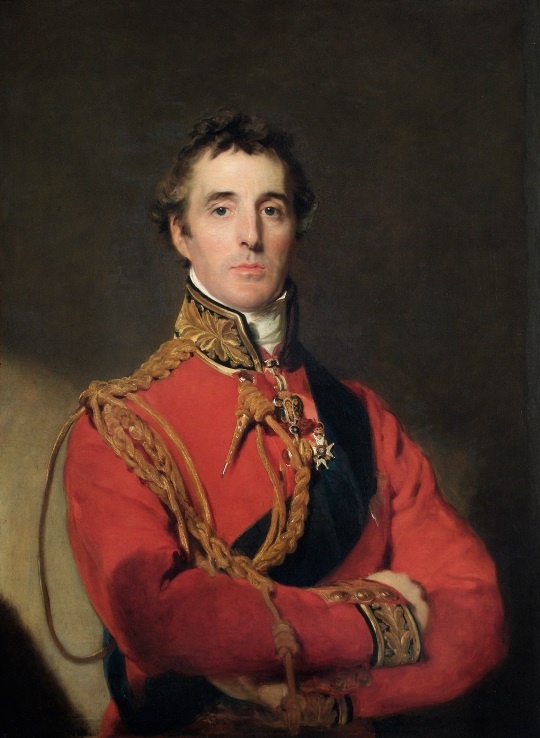
Arthur Wellesley, 1st Duke of Wellington by Thomas Lawrence c. 1815-1816
Apparently, although the Duke of Wellington was a stern (or absent) father, he became a doting grandfather. His children respected and feared him, but his grandchildren were treated to a different side of him: he would write to the children in the house and watch their delight as the letters were delivered along with the family post; he and the children would play under the dining room table or stage pillow fights and call them the ‘Battle of Waterloo’, then the little ones would be awarded medals for their bravery (shillings hung with ribbons – red for the Army, blue for the Navy).
The first Duke of Westminster and his siblings were allowed to eat with the family from an early age, rather than in the nursery, and would spend the evening with their parents, romping and playing ‘hunt the slipper’. The father taught the children chess and Latin and read aloud to them in the evenings from Shakespeare, Gibbon and Sir Walter Scott.
The second Marquess of Salisbury took charge of his children’s education (the girls as well as the boys) when his wife died, gave them history lessons and corrected their essays.
It’s very likely that much of the parenting of the age (and much of the schooling, as Maria Grace’s post tells us) relied heavily on the adage ‘Spare the rod and spoil the child’. In the early years of the century, an otherwise affectionate father wrote to his wife “…with regard to your male cubs, I should recommend a wholesome application of the birch…” and Lady Lytton whipped her eldest son with nettles for lying.
Unavoidably, we look at the past with modern eyes and it often shocks us, even if we endeavour to accept that our predecessors governed themselves by principles very different to our own. Still, I would like to believe that Mr Darcy’s father was a supportive parent, even if he could have been a better judge of character where a certain Mr Wickham was concerned.
What a pity that the elder Mr Darcy didn’t stop in Cambridge for a surprise visit!
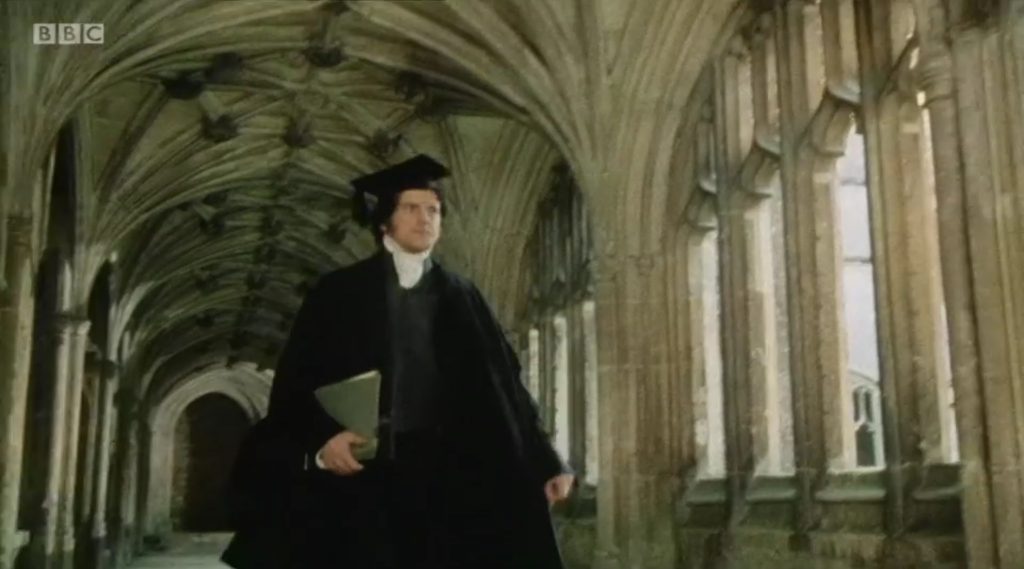
Photo: BBC
Even if that scene wasn’t in the book, it’s interesting to imagine Mr Wickham’s face if his godfather were the one who opened the door of his Cambridge lodgings and came upon him and his scantily-dressed companion.
But then again, the early Georgians were nowhere near as straight-laced as their Regency children and Victorian grandchildren, so who knows, maybe Mr Darcy the elder might have regarded young George’s peccadilloes with a mildly complacent eye.
Speaking of Cambridge, I thought you might like to follow in Mr Darcy’s footsteps and see where he might have gone when he left Eton or Harrow or one of the other public schools he might have attended.
We are not told specifically that he had attended one of the Cambridge colleges, but we do know from his letter to Elizabeth that Mr Wickham had. Seeing that Mr Darcy the elder intended his godson for a career in the church, we might wonder why George Wickham was not sent to Oxford, which in those days was considered the place to go to study divinity. I think it’s safe to assume that Wickham was sent to Cambridge because Darcy was. Ah, but at which college? We’ll never know, so we can only guess. And this is what I did a couple of years ago: I walked through Cambridge on a guessing trip. I was lucky to have my very dear friend Mira Magdo for a guide, and we went, had a peek, took lots of photos (of course 😊), but the matter still remained undecided.
So, what do you think? Which one of these might have been Mr Darcy’s college?
CHRIST’S COLLEGE
(Former members: John Milton; Charles Darwin)
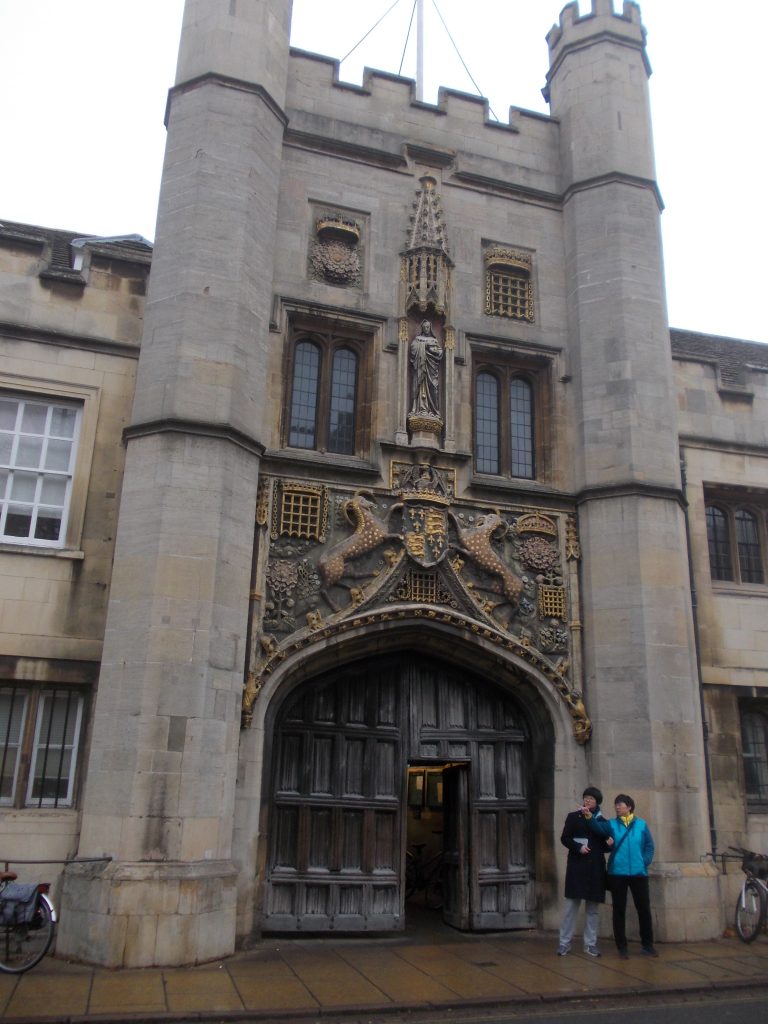
KING’S COLLEGE
(Former members: Sir Francis Walsingham, Queen Elizabeth I’s spymaster; Charles ‘Turnip’ Townshend, statesman and promoter of crop rotation; Sir Robert Walpole, England’s first de facto Prime minister; Horace Walpole)
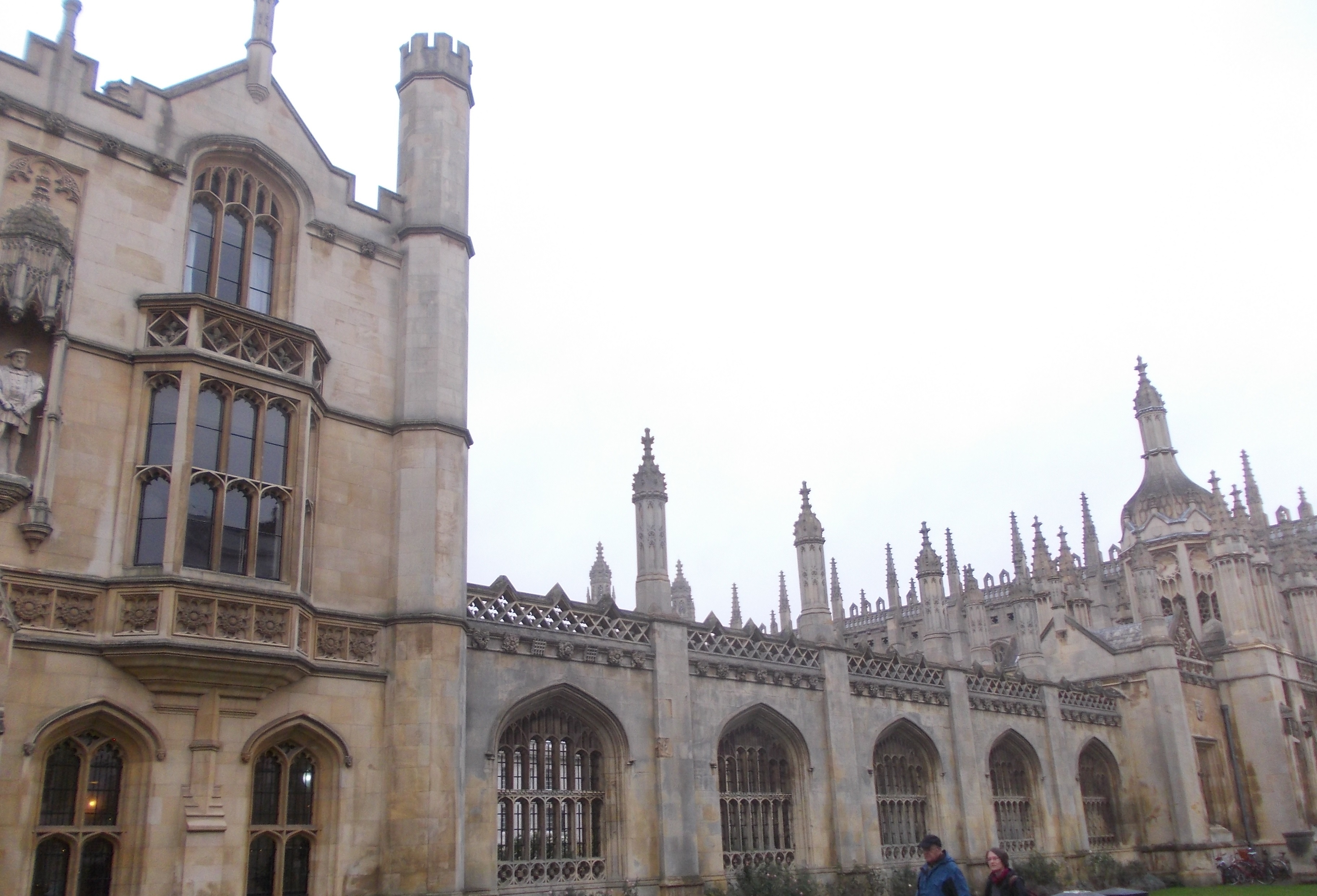
ST JOHN’S COLLEGE
(Former members: Lord Palmerston, Prime Minister; William Wilberforce; William Wordsworth)
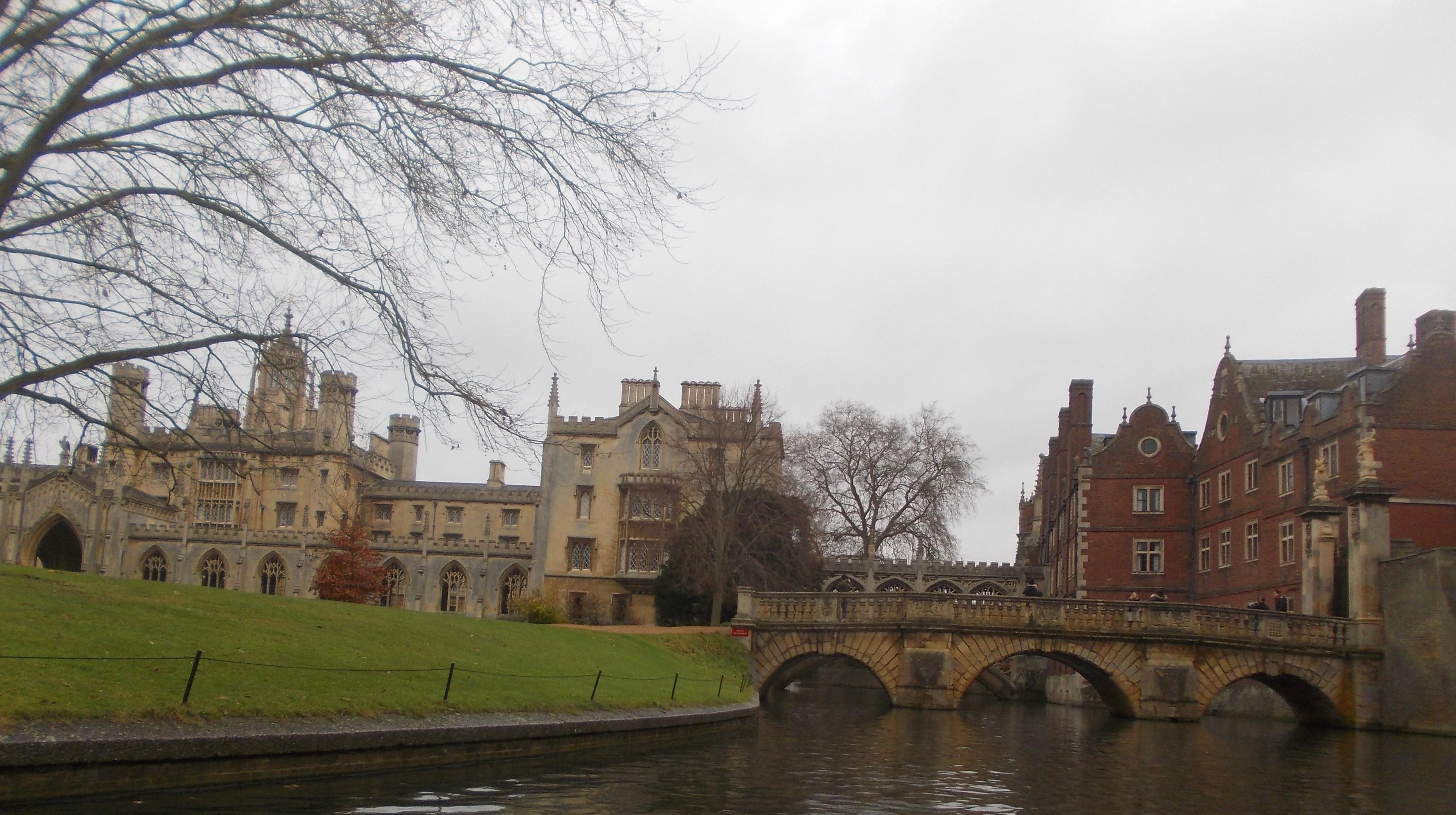
TRINITY COLLEGE
(Former members: Francis Bacon; John Dryden; Isaac Newton; Lord Byron; William Makepeace Thackeray; Lord Tennyson; Lord Grey, whose government introduced the great Reform Bill of 1832)
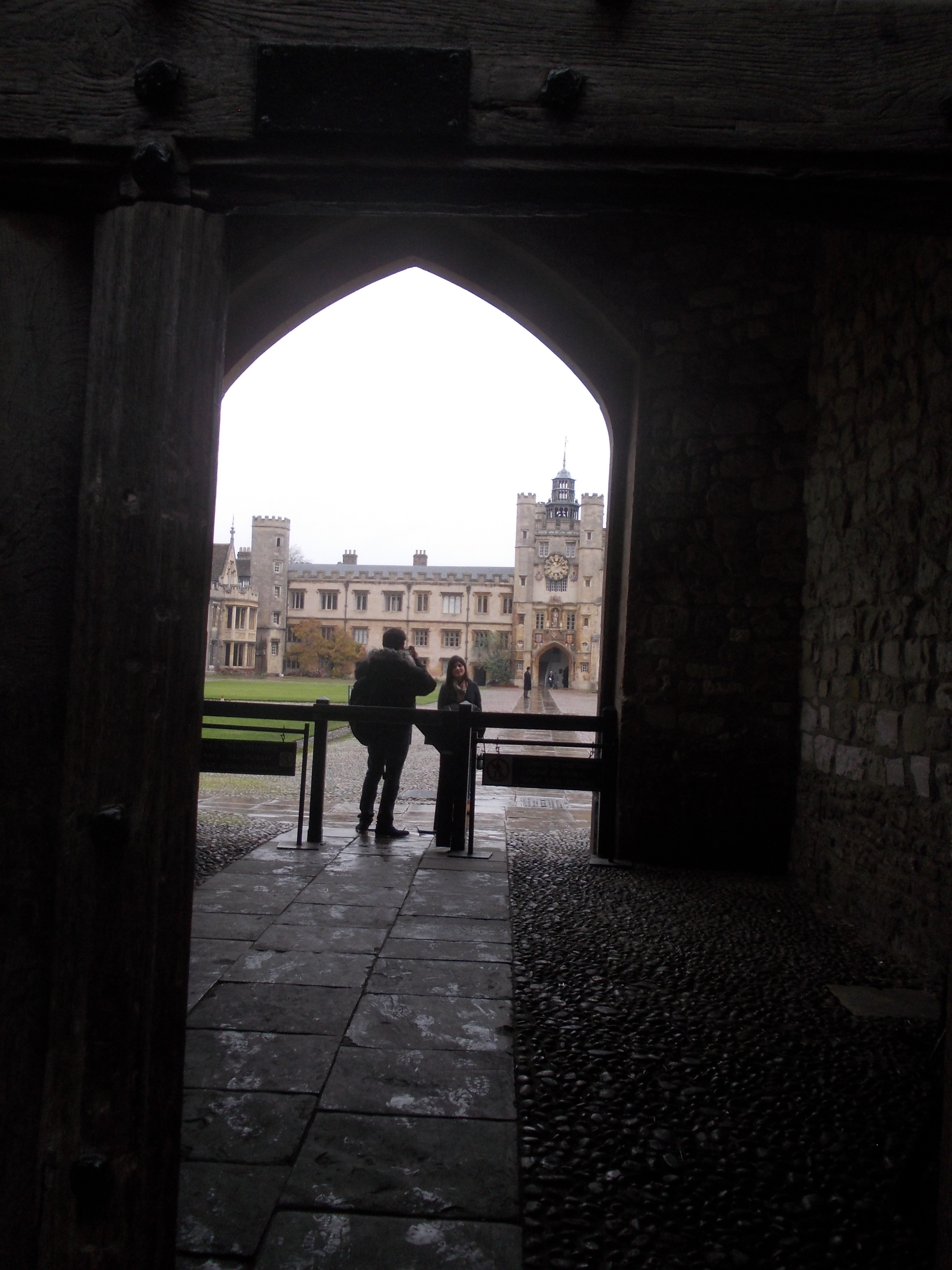
ST CATHARINE’S COLLEGE
(Former members: Adam Buddle, botanist; John Addenbrooke, founder of Addenbrooke’s Hospital)
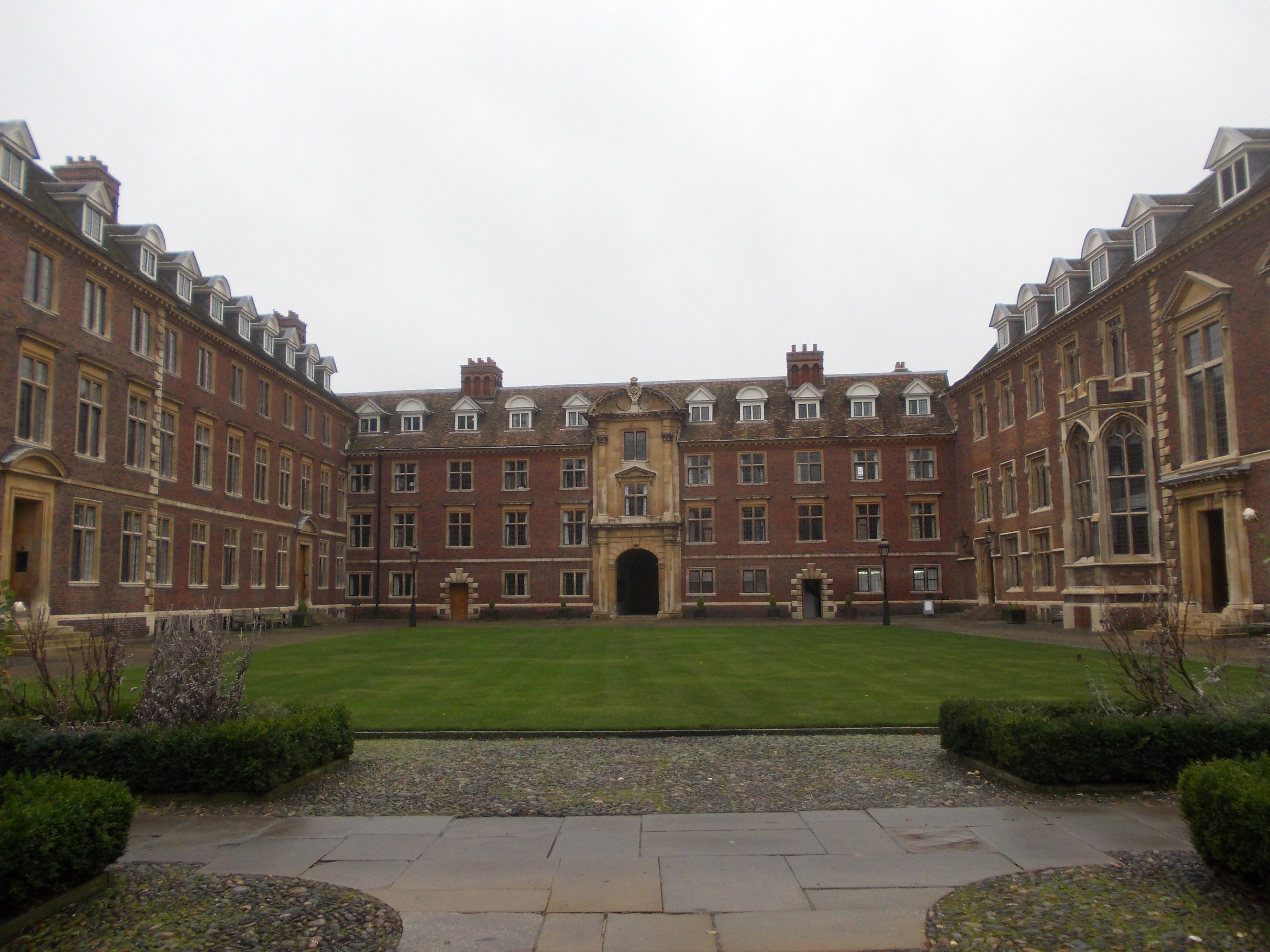
PEMBROKE COLLEGE
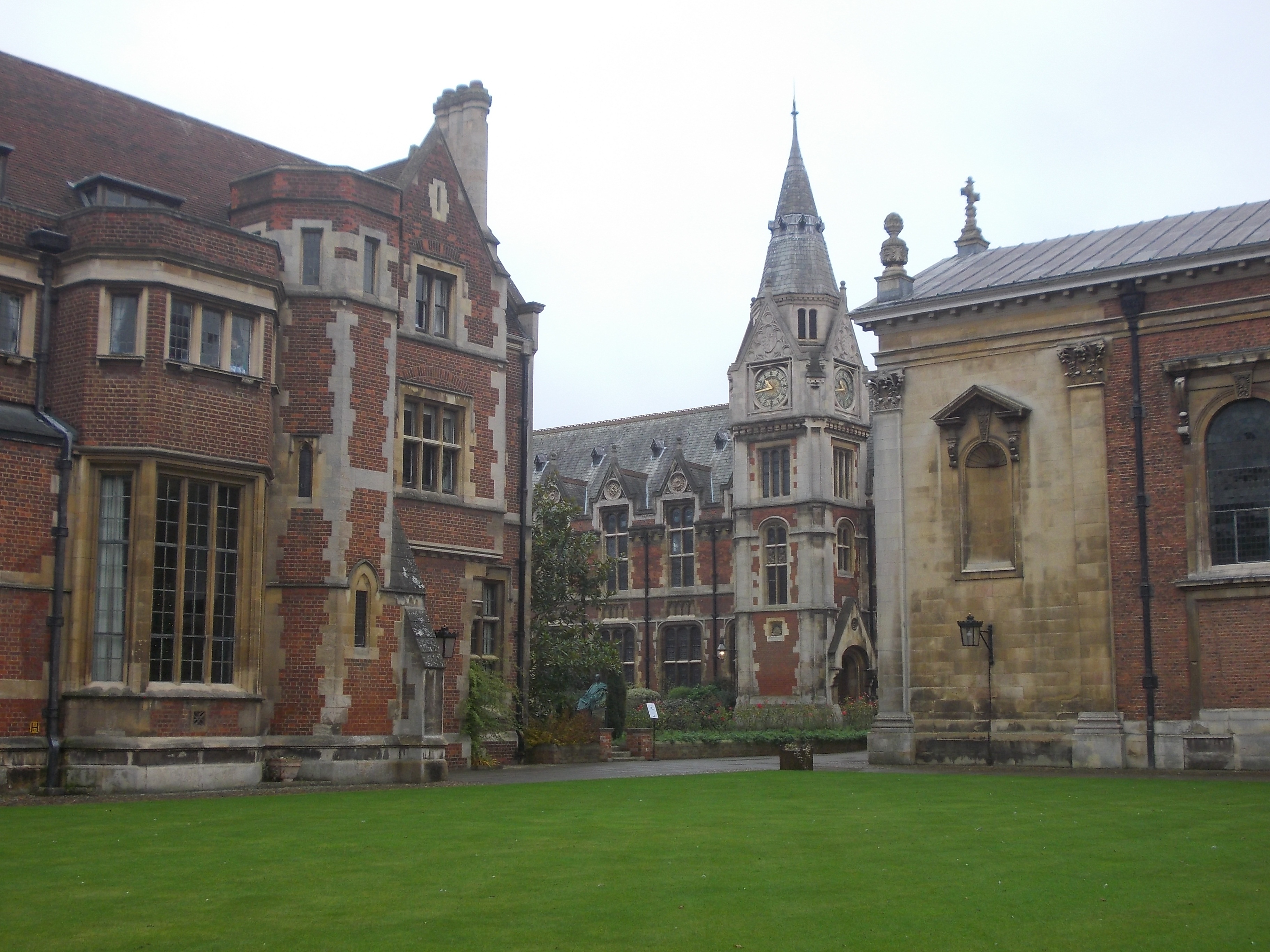
QUEENS’ COLLEGE
One of the things I discovered on my trip is that the colleges are best seen from the river.
Can you picture Mr Darcy and Mr Bingley punting on the Cam?
Photos of Cambridge locations: J STARNES
I wonder where else they might have gone to amuse themselves (because even the dedicated Mr Darcy must have taken the odd break from his studies).
Needless to say, the all-powerful colleges sought to limit the opportunities for entertainment, which would distract the students from loftier pursuits. The annual Stourbridge Fair was a traditional source of tension between ‘Town’ and ‘Gown’ i.e. between the Cambridge Corporation (the town council) and University officials:
“From the 13th century onwards, Stourbridge Fair was the biggest trading event locally and beyond. […] Young people attended for the social opportunities, enjoying dances, concerts and theatres, mingling in the hope of either procuring a partner or else indulging in some innocent coquetry. Unknown and lovesick poet ‘Mr Travis’ wrote, “To the Fair Unknown, upon seeing her in the Music Booth at Sturbrige fair [sic]”. However, the Fair also attracted a darker underbelly – beggars, thieves and prostitutes […].
Representing all that was sinful and distracting for students, the entertainment was specifically disapproved of. In 1740, the Vice-Chancellor ordered the Theatre Booth to be demolished, gambling ‘games’ such as Roly Poly and The Colour Board to be carefully monitored or banned altogether, and even entertainers to curb their acts.
As always, those who made rules often broke them; University officials disregarded the prohibition of the Fair’s ‘idle games and diversions’ listed in James I’s charter. In the 1780s, Vice-Chancellors spared no expense in ordering the same menu each year: herrings, neck of pork, round of beef, goose, plum pudding and apple pie, and dined in a private, tiled booth. In the 1790s, the Master of Emmanuel College Dr Richard Farmer was regularly spotted guffawing in the front row of the Critic’s Row at the Playhouse of the Fair. Reports claim that Masters of Arts, Fellows and clergymen were often seen drunkenly singing and linking arms as they stumbled through the Duddery.” (The 800-year-old story of Stourbridge Fair)
By the time Mr Darcy might have attended Cambridge, the old rules were not so strictly adhered to, anyway. Theatrical performances, once forbidden within five miles of the city for fear that they would corrupt the students, were here to stay:
“…in the late eighteenth century, a permanent theatre was built on the edge of the fairground [on Newmarket Road, on a site next to the Sun Inn]. There, fairgoers could see plays by Shakespeare, vaudevilles and melodramas, and even, in September 1797, an opera which had previously been performed at the Theatre-Royal, Covent Garden.” (Creating My Cambridge: Stourbridge Fair).
The Stourbridge Fair Theatre is no longer there. By 1814 it was already demolished and replaced by The Festival Theatre, which had its own eventful history, from Georgian playhouse to mission hall and is now a Buddhist centre.
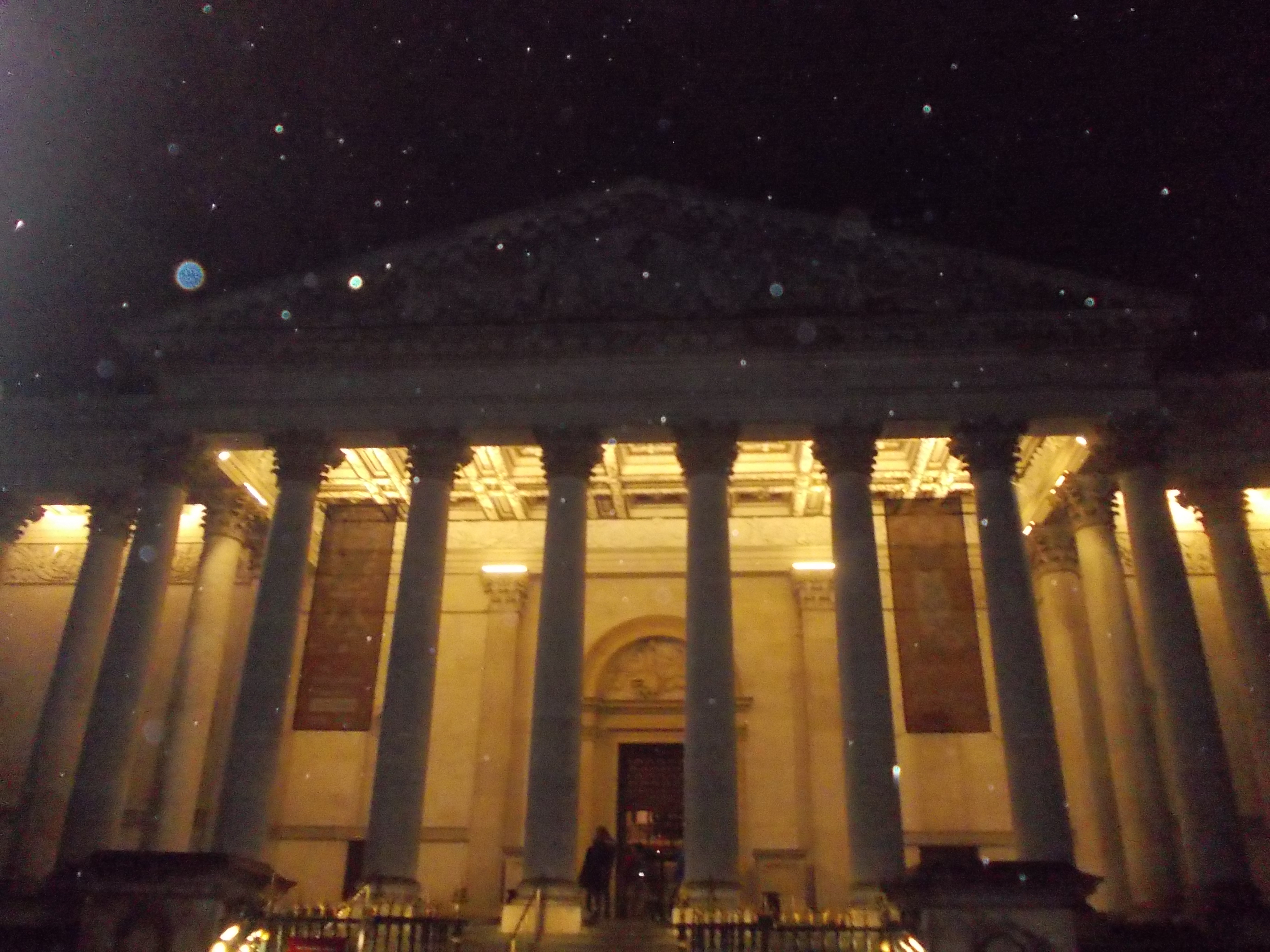
While the outline of the colleges hasn’t changed in hundreds of years, it’s hard to believe that Mr Darcy would not have laid eyes on the Fitzwilliam Museum as we know it, or at least not during his university years.
The museum was founded in 1816 with the legacy of the library and art collection of the 7th Viscount FitzWilliam and was initially located elsewhere (in the old Perse School building in Free School Lane). The first stone of the new building was not laid until 1837.
Young Mr Darcy might have wandered through the Walkerian Botanic Garden with a book under his arm and found a quiet bench to read in peace, but we can’t follow in his footsteps there. The site is now occupied by the Cavendish Laboratory and other university buildings, and the University’s Botanic Garden can be found farther from the centre, on a much larger site.
The face of the age-old city has changed in many other ways. Even places steeped in tradition, like Oxford and Cambridge, can’t remain frozen in time, so thank goodness for old maps!
I didn’t have an old map of Cambridge with me, so one of the things I couldn’t find was a coaching inn old enough to have been patronised by Mr Darcy, his cousin and his friend. With any luck, I might find one next time. But never mind, there’s always the full English at Fitzbillie’s (and as we know, a Fitzbilly NEVER disappoints 😊 ).
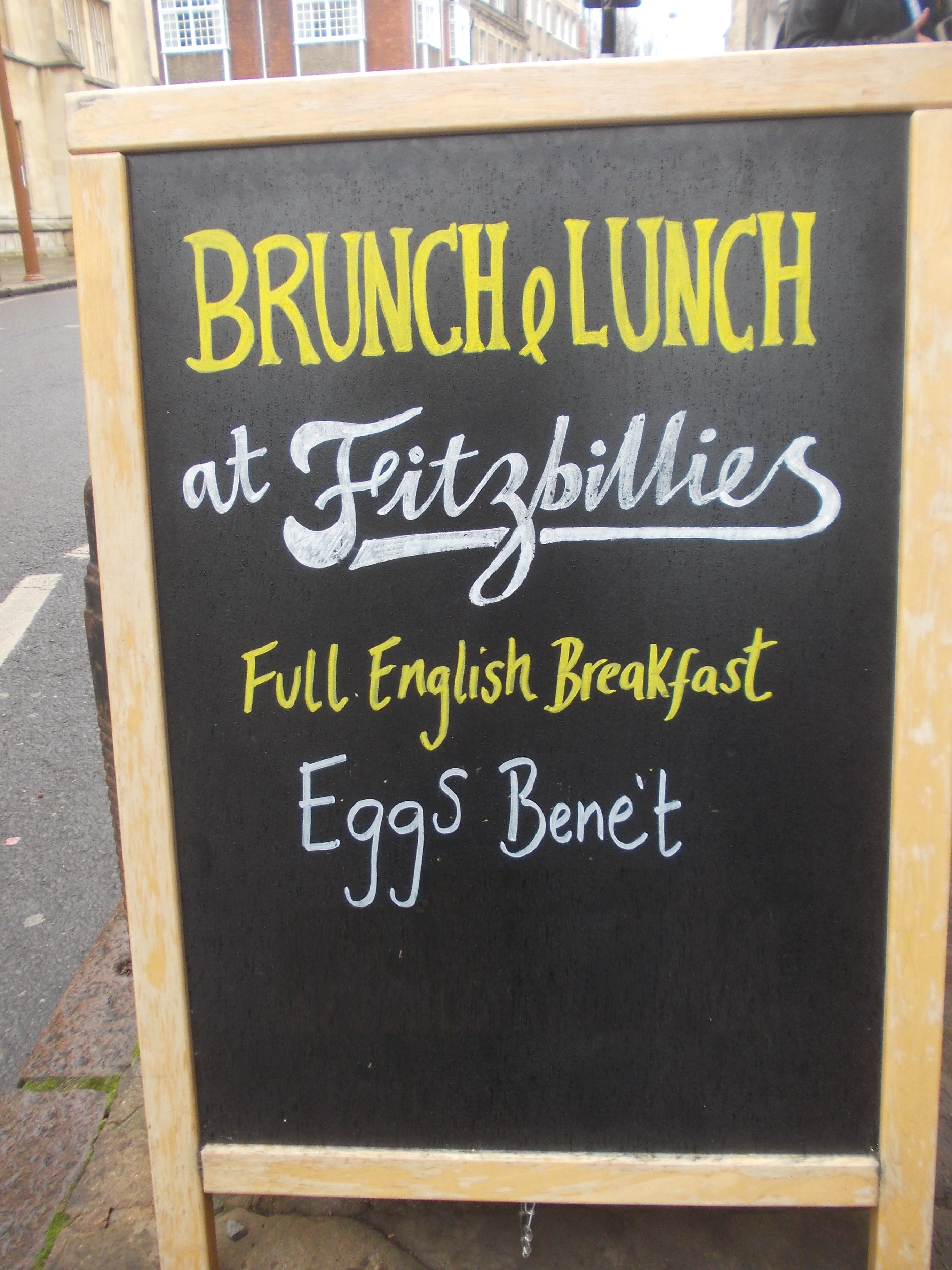

18 comments
Skip to comment form
This is a simply fabulous piece, one that I have been waiting decades for somebody to write, and me to read! Thank you so much, Joana. The perfect blend of informed research and inspired imagination.
I visit Cambridge every year but have never even begun to think about where Mr. Darcy might have walked and read…bless you for taking the plunge (no Firth reference intended!). You’ve given me so much more to ponder next time.
Thank *you* ever so much, Diana, for your very kind words! I’m so glad you liked the post!
I didn’t realise you visit Cambridge every year. It would be lovely to see you there sometime. Have a wonderful time on your future visits and thanks for the early morning giggle over the Firth reference. It’s nice to start the day with that mental picture 😀
All the best to you and your family and have a lovely December!
Fantastic post Joana! I live about an hour away from Cambridge so really have no excuse for not visiting more often, but whenever I do, I love imagining the characters of some JAFF escapade set amongst all the old buildings. And I always smile at the cafe name “Fitzbilly.” Though I think of it more of a nickname for the more relaxed Colonel than for Darcy. Thanks for a fun and informative post!
Thanks for reading, Jessie, I’m so glad you liked it! You’re so lucky to live so close to Cambridge, it’s such a gorgeous place. I wish I lived nearer and visited more often. It’s such fun to imagine JAFF characters in places that are old enough to have been around in Jane Austen’s time.
LOL that’s so true, Fitzbilly is a perfect nickname for the colonel. Or a perfect nickname for the colonel to use, whenever he wants to vex his cousin exceedingly 😀
Take care and have a lovely day!
What an interesting post! I love the idea of imagining the young Darcy as a diligent student relying on his older cousin to stave off the bullies who might beset him. As to which college he might have attended, I’m thinking King,s College due to the promoter of crop rotation having attended. It would be a necessary skill for his eventual inheritance of Pemberley.
I’m so glad you liked the post, Regina Silvia. That’s a great point about Lord Townshend, and besides King’s College looks wonderful. Especially the Bridge of Sighs. Thanks for stopping by and sharing your thoughts!
OMG! Joana, that was fabulous. I’ve never felt closer to our Darcy. You made it so real. I could feel his excitement and pleasure as he would have walked the same steps as you did. Your photos are always the best and these were no different. Thank you.
Thanks so much, Jeanne, I’m SO glad you liked the post and that it made you feel closer to our Darcy :)). What a lovely thing to say!
I do hope that one day we might meet up in some P&P-related locations and imagine our dear characters gallivanting around while we chat chat chat and take hundreds of pictures. Till then, thanks for coming on virtual trips with me.
Fair amount of assumptions-
– Darcy’s older cousins (the colonel may have been younger and his rank may have been bought)
It is assumed that Col Fitzwilliam is older than Darcy, I guess because of his excessive familiarity and natural self confidence and his better social skills which may be attributed to maturity. But sometimes I think it does fanfiction well to buck that assumption and make Darcy the old man lol
– that Darcy went to Cambridge
Again the text does not explicitly say that Darcy went to Cambridge but the inference that he could have observed Wickham when his father could not have suggests it. Sometimes though, I think it also interesting to buck convention and place him as an Oxford rower, like so many other Austen heroes as well as family, and have him observe Wickham and his cronies during Oxbridge clashes (haha)
– that Darcy and Bingley shared college experiences – this is the most improbable (but not impossible) assumption. I always think the age difference too great to have Darcy and Bingley at University together. I prefer to think their ‘respectable’ families from the north of England were known to each other.
All that rubbish said (lol) if I had to choose a Cambridge college for Darcy, I’d go with Christ College. I think it was (probably still is ) the best, with the highest academic standards and I like that it was influenced by a woman. Very much suited to Darcy all things considered.
Thanks for the great research and lovely pics!
Thanks for this lovely long message, JRTT, and the opportunity to chat about P&P!
Oh absolutely, Colonel Fitzwilliam’s commission was very likely bought. But maybe if he didn’t have an inclination for a military career he might have settled for something tamer and closer to home, like a career in the church for instance. The fact that he is older isn’t just an assumption. When Elizabeth met him for the first time in Hunsford, we are told that Col Fitzwilliam was ‘about thirty’ (and then that he was ‘not handsome’, but I’ll pretend I haven’t seen that 😀 ).
He-he, that sounds like fun, imagining Darcy and Wickham on different sides in Oxbridge clashes!
I know what you mean about the age difference between Darcy and Bingley. Five years is an awful lot when one of them is 19-20 and the other 14-15. Maybe they first met at Eton or Harrow and forged their friendship there, as Maria Grace suggested in her post about Educating Mr Darcy. Darcy could have taken poor little lost Bingley under his wing. I don’t know, maybe I’m not giving Mr Darcy the elder enough credit, but I have this feeling that he wouldn’t have socialised all that much with a family that was just one generation removed from trade. On the other hand, he can’t have been as snobbish as Lady Catherine, so who knows, maybe he did have business dealings with Mr Bingley Sr and a close relationship was established between them, and thus between their sons. Isn’t it fun to speculate about them, though? Sometimes I forget they’re fictional (OK, I almost always forget that 😀 ).
Love that your vote went to Christ College! I didn’t research academic standards, but there was a wonderful feel to it when I visited. Many thanks for sharing your thoughts and hope we’ll chat again soon. Best wishes and thanks for reading!
Awww damnit! I forgot that ‘about thirty’ bit lol.
And thank you for responding, I think you’re a great writer, I have all your books! So my pleasure in your response is real.
I love pushing the fan fiction envelop. Not for big things like making major characters totally OOC, but for little things, all those assumptions that JA leaves to the imagination. I like when writers challenge the prevailing status quo like the ‘older, orange Caroline’ or the Bingley who is described as a puppy.
I like when the imagination is fueled by subtle details rooted in the period, like maybe Darcy never went to a King’s public school, maybe he was home schooled, which sounds really provincial, unless it’s called for what that might have been ‘ a time of rigourous learning by the highest experts available at home and supervised by his mother’. The lack of laws and discretionary standards make anything possible.
In terms of university I AM partial to Cambridge over Oxford probably because I did Cambridge A’Levels so maybe I could like just share THAT connection with my imaginary hero? Lol
I also like that Cambridge is just north of and shares a boundary with Hertfordshire…I mean, in the fictional world anything is possible right? 😉
Lastly about University either Cambridge or Oxford, it is said that history is rooted in the psyche of the British and that there is a looooooong tradition of appreciation for history architecture and conservation and the pictures you posted clearly depict that. Imagine what a Darcy might have felt to have had that sense of place where he could see and touch architecture from the Elizabethan and the Stuart and the Queen Anne and the early Georgian periods. That he could learn the history and experience it at once. Perhaps I’m applying too much sensibility, but I think he would have gotten it and maybe feel some of Elizabeth’s regret in that regard.
I really enjoyed the research that you did and will definitely save it. That bit about Wellington being the stern/absent father with his children and a doting grandfather especially stayed with me. Made me think that perhaps It reflected some of his regrets in having to make sacrifices while fighting for his country. I thought in a way that reflected his humanity. made me also think that the elder Darcy could have been like that. Sometimes great wealth and inherited opportunities did not sit well and people felt they must DO something more ( explains Wickham for me lol).
Anyway, I wrote an essay…sorry!
Good morning, and thanks again for this! I loved your essay!
Well, that ‘about thirty’ bit could be seen either way. That April, Darcy was supposed to have been 28-29, and that’s ‘about thirty’ too, so who knows? This could easily introduce other subjects for lovely speculation: Darcy’s and Elizabeth’s DoBs. She strikes me as an Aries and so does he, to some extent, but he could have easily been a Leo or a Taurus (I don’t buy into horoscopes btw, but it’s still part of the fun).
Thanks ever so much for the kind words about my writing, I’m so happy you read my books and enjoyed them!
LOL I love that, pushing the fanfic envelope :D. So true, we can read the little things (and sometimes the big ones) in so many different ways! This is one of the many things I love about JAFF: that even if we’re looking at the same set of novels & characters, each author weaves in their own interpretation, and it makes for such a fabulous variety.
Wow, Cambridge A levels, that’s such a badge of honour! And I love the ‘sharing a boundary with Herts’ bit and the possibilities. I’m partial to Cambridge over Oxford too because it’s mentioned in P&P and because I think it survived the test of time rather better. The whole layout, the main colleges dotted along the Cam, makes for a much prettier picture. Whenever I tell my husband that I wish we lived nearer to Cambridge than Oxford so that I could visit more often because I love Cambridge’s general appearance more, he teases me about the whole Maclean, Burgess, Philby and Blunt business, and what would Mr Darcy have said about *that*?? I try not to rise to it and just say hey, that was 175+ yrs later, so it doesn’t count.
I love what you said about Darcy’s appreciation of that sense of place and of the Elizabethan, Stuart and early Georgian history surrounding him. It’s so touching that no matter what century we live in, some of us will look back fondly at the past. We look at Regency, Regency people like Sir Walter Scott looked back at medieval times, no doubt some of the early Anglo-Saxons, tired of the savagery of the Dark Ages, were looking back with admiration towards the Roman love of art, symmetry and order… Oh well, that’s not making me get my head out of the history books to focus on the present, the untold advantages notwithstanding. Thank goodness for modern medicine, sanitation and women’s rights (among the many things we have to be thankful for), but the glimpse of the green & pleasant land (before they went and built all the dark, satanic mills 😀 ) is still appealing.
So glad you enjoyed the research I did! I often need to stop myself from digging deeper and keep it light rather than turn it into a full-on history essay, but it’s very enjoyable either way. I love the point you made about the Duke of Wellington’s humanity, and the elder Mr Darcy wanting to do something more than enjoying his wealth and privilege, hence assisting Wickham. Thanks again for this lovely conversation and for sharing your thoughts! All the best and chat again soon. I’m also on FB, if you’d like us to speculate some more on this, that & the other :)).
Joana!!!! Magnificent piece. I’ve never been anywhere in Jane Austen land and this puts me where Darcy may have been and I’m there with all the possibilities. With all that research and photos you should do a book. Just sayin’ !! LOVE it!
Thanks SO much, Sharon, I’m so happy you loved the virtual trip and all the possibilities!! Thanks for reading the post and for your ever so kind words. Take care, have a lovely day and I’ll try to plan another virtual trip soon. Hope you’ll like that too.
Wonderful post and fabulous pictures as always. Thanks so much, Joana.
Thank *you* for stopping by to read the post, Jen. So glad you liked it!
I think I’d go for Pembroke or Peterhouse. Sadly, the only sure thing is that he didn’t have a chance to go to Newnham or Girton!
I truly enjoyed this virtual tour and your reflections on the past. I always wonder how things of the past, most particularly for ODC, worked and love reading this kind of articles.
In response to your question about which one of the colleges Darcy attended, i can’t decide, but my first guess is St. Catherine, followed by King’s, then Trinity.
In regards to how older Darcy interacted with his son, I have a feeling that he was a kind hearted & warm person and would have perhaps visited his son, but I think that despite his feelings and wishes he never did. I feel that he tried hard to make a resilient and reserved future master of Pemberley. Therefore, he did not show as much as affection that might have been in his heart. For Wickham he didn’t have such scruples, hence the worthless man assuming that he was loved and adored more than George Darcy ‘s deserving son.
I am not certain how he would react to Wickham’s half naked Companion. I lean toward your suggestion that he might have considered it a very ordinary thing since they used to send their sons to the continent to sow as many as wild oats they can without leaving a trail of illegitimate offspring in their neighboring counties. I sometimes roll my eyes when I read in some P&P variations that Darcy was a virgin. I think what Darcy did not approve about Wickham was his preying on innocent, poor local girls and not having a proper sexual relief using a high payed cortesean. Also, it appears that his objection to Wickham was that he waisted all his time gambling and debauchering rather than studying to make a career out of his expensive education.
Thank you again for the delightful article.